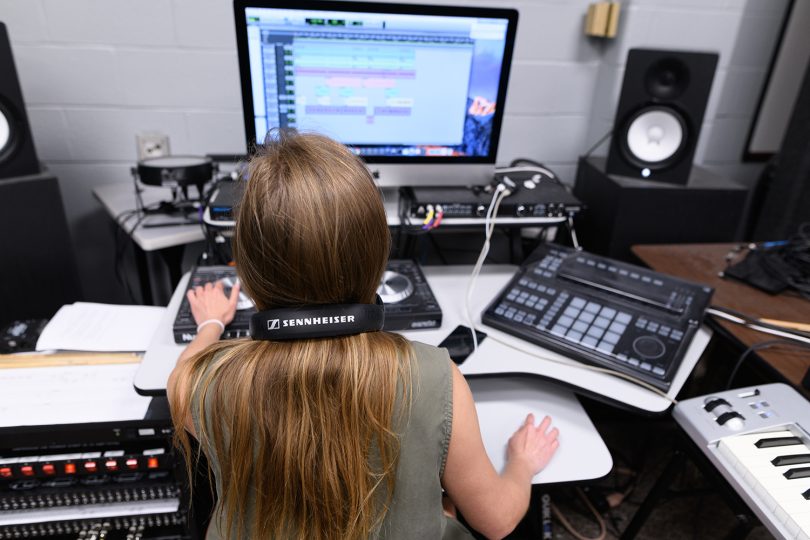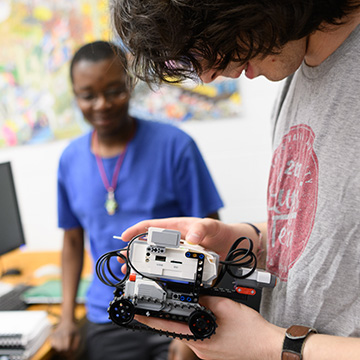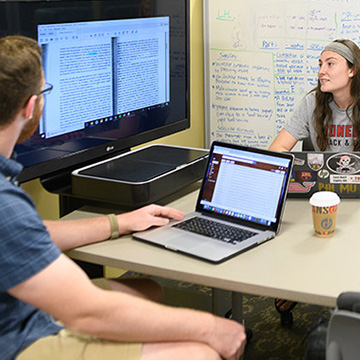
Transylvania University is expanding its Digital Liberal Arts initiative to give students an edge in a world increasingly dependent on new technologies.
The Bingham Board of Trust recently authorized a grant to provide Transylvania with $271,000 over the next three years to continue the program, which was launched in 2017.
Examples of what the money will fund include a Digital Liberal Arts Summer Institute for faculty development, hardware to improve student access to technology, research, guest speakers and collaborative projects by teams who will present their work to the Transylvania community and possibly at off-campus conferences, symposiums and the ILiADS Institute for Liberal Arts Digital Scholarship.
The coronavirus pandemic certainly drives home the urgency of adopting new technologies and integrating them into the university’s liberal arts mission. Timothy Polashek, a DLA co-director and music professor, pointed out how the program has helped prepare the school for remote learning “in a way unique to Transylvania’s personalized and intimate approach to learning.”
The university recognized the value of technology to the liberal arts well before COVID-19, though. And this focus has produced noticeable results.

“During the first three years, the Transylvania Digital Liberal Arts initiative has led to some striking curricular innovations — from mathematics to political science to the arts,” Polashek said. “Students are using technology to change the way they think about, analyze and solve both classical and emerging problems, as well as to creatively express themselves through interactive media. The new grant is exciting because we can continue and build upon all this momentum.”
The DLA initiative ties into the school’s strong liberal arts tradition, which encourages collaboration, interdisciplinary exploration and asking the big questions. “Transylvania’s approach explores what it means to be human, now in this turbulent time, and how to thrive in the future,” Polashek said.
“Something magical happens when you get students, staff and faculty talking and experimenting together to push technology,” he continued. For instance, English classes may develop digital fantasy leagues for literary characters, while history students critique video games like “Assassin’s Creed” for its portrayal of the ancient past.
Polashek noted how the DLA initiative will be “even more intentional about interdisciplinary work” through the collaborative project teams made up of faculty, staff and students using a variety of technologies, from podcasts to data visualization.
Emily Elizabeth Goodman, DLA co-director and art history professor, also sees tremendous value in teams working across academic disciplines. “We are excited to see faculty, staff and students develop truly interdisciplinary digital projects that can both transform the teaching and research we do at Transylvania. This will be a unique opportunity for meaningful scholarly collaboration that could engage a wide variety of areas and potentially lead to new initiatives.”
In addition, Goodman looks forward to hosting the DLA Summer Institute, which will in part build upon the work of the Transylvania Seminar, Liberal Education: Approaching the Digital. This 2018 seminar drew faculty from colleges across the country, including Vassar, Bard and Rhodes.
“We hope that this will help faculty engage with new technologies and share their experiences in the hope that we can further expand the ways that digital tools are being used within classes,” she said of the DLA Summer Institute.

Goodman also mentioned how the initiative over the past three years has helped faculty incorporate new technologies like blogging, video editing and podcasting into their courses, developing students’ research, technical and communication skills. “Students consider how argumentation and debate exist across different media,” she said, adding that they “stop seeing themselves as passive consumers of digital content and start seeing themselves as members of a digital community with ideas worthy of sharing.”
Rebecca Thomas, vice president for academic affairs and dean of the university, said the recent grant will build upon the foundation of the DLA, which has had “a significant effect on Transylvania’s intellectual environment” over the past three years.
“I’m particularly excited about all the collaborative aspects of this new funding,” said Thomas, specifically noting the DLA Summer Institute, team projects and how the ILiADS institute will “bring us into richer conversation” with the wider digital liberal arts community.
“I applaud the vision of the DLA team that wrote the proposal and the vision of the Bingham Board for approving the funding,” Thomas said. “As digital tools become increasingly important in supporting our teaching, learning and scholarly work, it is good to know that Transy can continue to lead in exploring new intellectual and creative opportunities.”

